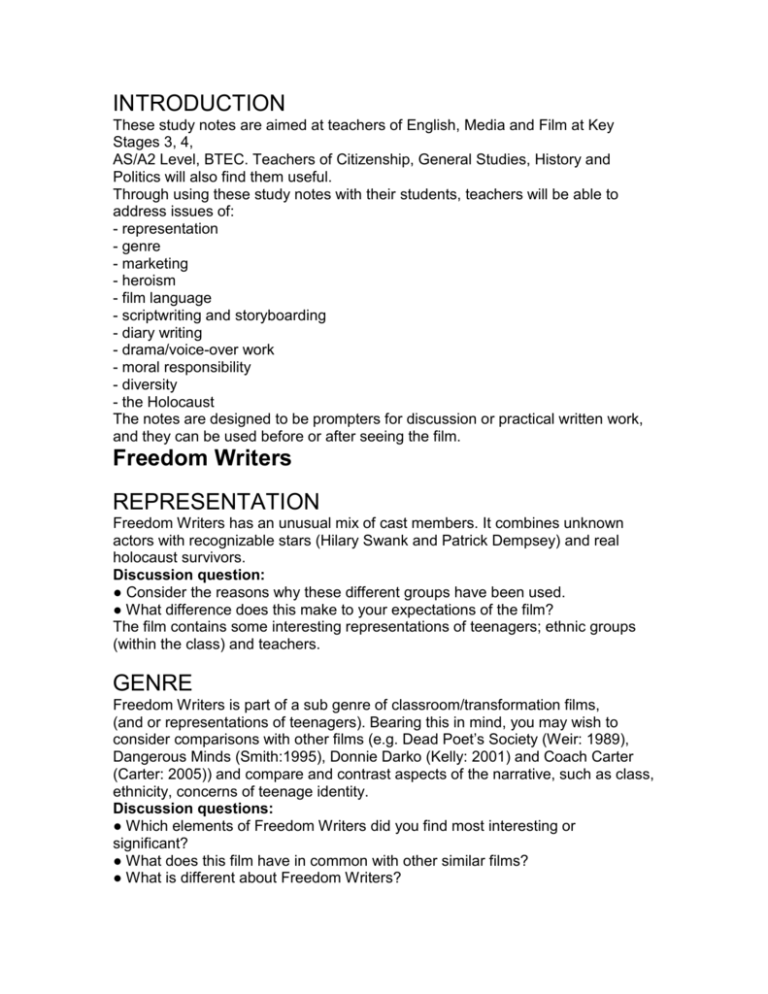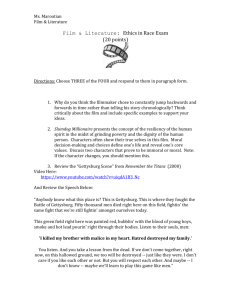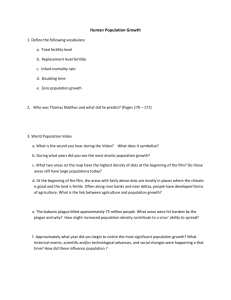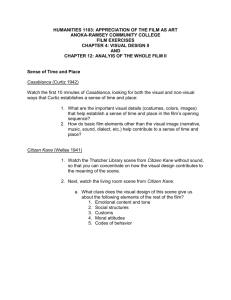
INTRODUCTION
These study notes are aimed at teachers of English, Media and Film at Key
Stages 3, 4,
AS/A2 Level, BTEC. Teachers of Citizenship, General Studies, History and
Politics will also find them useful.
Through using these study notes with their students, teachers will be able to
address issues of:
- representation
- genre
- marketing
- heroism
- film language
- scriptwriting and storyboarding
- diary writing
- drama/voice-over work
- moral responsibility
- diversity
- the Holocaust
The notes are designed to be prompters for discussion or practical written work,
and they can be used before or after seeing the film.
Freedom Writers
REPRESENTATION
Freedom Writers has an unusual mix of cast members. It combines unknown
actors with recognizable stars (Hilary Swank and Patrick Dempsey) and real
holocaust survivors.
Discussion question:
● Consider the reasons why these different groups have been used.
● What difference does this make to your expectations of the film?
The film contains some interesting representations of teenagers; ethnic groups
(within the class) and teachers.
GENRE
Freedom Writers is part of a sub genre of classroom/transformation films,
(and or representations of teenagers). Bearing this in mind, you may wish to
consider comparisons with other films (e.g. Dead Poet’s Society (Weir: 1989),
Dangerous Minds (Smith:1995), Donnie Darko (Kelly: 2001) and Coach Carter
(Carter: 2005)) and compare and contrast aspects of the narrative, such as class,
ethnicity, concerns of teenage identity.
Discussion questions:
● Which elements of Freedom Writers did you find most interesting or
significant?
● What does this film have in common with other similar films?
● What is different about Freedom Writers?
Genre is often used as a selling point for a film. In groups, think carefully about
the film as a
whole.
Discussion questions:
● What would you say is the ‘Unique Selling Point’ of the film?
● Do you all agree?
MARKETING
Most cinemagoers find out about future titles through the film’s trailer, or its
poster.
Poster Activity:
Imagine that you are involved in the marketing of the film to a UK audience; part
of your job is to develop a poster campaign.
What images or aspects of the film would you like to use to reach your audience?
Once you have decided on the images, think about taglines: what message do
you want to get across?
Where would you like to showcase these posters? Think about location e.g. bus
shelters as well as magazines, newspapers, internet ads.
Why have you chosen these locations?
Make reference to your target audience.
Radio Advert Activity:
In addition to the poster campaign you could develop radio ads. The ad would
last for 30 seconds (you may wish to develop a set of three).
● What do you need to tell that particular audience?
● What material from the film would you use?
● When would you run them? Which radio stations and why?
Another way of marketing a film is through its stars. In Freedom Writers we see
Hilary Swank playing Erin Gruwell.
Discussion questions:
● What expectations do we have of Swank as an actress?
● In what type of film does she usually feature?
Consider her filmography and the awards that she has won etc.
● What difference do you think this makes to audiences?
● Do you think the film would be as easy to promote without her?
● We see at the end of the film images of the real Gruwell with students. Does
this make the film more affecting for you?
HEROISM
Miep Gies, the daughter of the family that sheltered Anne Frank is the ‘hero’ of
one of the students. She says that all the kids are ‘heroes’.
Discussion questions:
● Why does she say this?
● What qualities make a ‘hero’?
● Who is the ‘hero’ of the film?
● What qualities do you expect a film hero to have?
● Are the qualities that make a real-life hero different from a film hero?
● What other ideas of a ‘hero’ does the film present?
● Who are your ‘heroes’ – why?
Research your own personal hero(es).
Try to persuade your class/group that this person is worthy of their attention.
What facts and what kind of language are you going to use?
Think also about the delivery, where will you put emphasis on what you say?
FILM LANGUAGE
The film shows a number of forms of self-expression, for example diaries;
discussions and rap lyrics. In addition we see interactions between Gruwell, her
students, colleagues and family.
In all of these instances language is used in ways that offer particular
interpretations of events and rely on the film spectator to have an understanding
of the dynamic. Read the following activities and consider some of these points in
further detail.
‘Badness’Activity
Once you have seen the film, consider the ‘badness’ clip (where Gruwell
apologies for her ’badness’) and consider why the students in her class find it
funny.
● In language terms what has happened in this scene?
● How did this work for you as an audience member?
● Were you laughing at Gruwell and with the students? Or were you able to
understand Gruwell’s usage?
● What does this tell us about the target audience for the film?
Discussion question:
● After you have seen the film, consider the use of slang, register and tone and
think of other scenes that demonstrate this.
SCRIPTWRITING AND STORYBOARDING
NB: Teachers, please refer to the Storyboard Teaching Resource linked to these
study notes at www.filmeducation.org
Filmmaking is a complex procedure. Each shot, scene and sequence is carefully
planned and mapped out in terms of character exposition; plot; pace and
narrative impact.
Activity
Choose a character from the film with whom you particularly empathise and
script a sequence that would provide the audience with additional information
about him/her.
You should think carefully about:
The type of language that is appropriate for this character.
What would they say out loud?
What we, the audience, would be privilege to perhaps through voice-over or
through visual clues such as close-ups or reaction shots?
What do you want the audience to learn about the character?
What kind of impact (emotional or otherwise) do you want this to have on your
audience?
Your scene must also include directions/technical information (diegetic sound,
etc.) as well as dialogue for the character(s) involved, where do you want them to
be on the set or in relation to each other?
Consider how body language can give us clues about a character’s feelings
towards others in the scene, or about their own ‘inner voice’.
Once you have considered the above points storyboard your sequence, make
sure that you use appropriate terminology.
DIARY ENTRY/MONOLOGUE
In Freedom Writers, the students write diary entries to express what they are
feeling and the problems that they are facing. We only get to hear some of these
diary entries.
Diary Entry Activity
Choose one of the following characters:
● Eva
● One of the boys in the class
● Erin Gruwell (Hilary Swank)
● Margaret Campbell (Imelda Staunton)
● Or another character that you liked or wanted to know more about
Then write a diary entry about Erin Gruwell’s first day at school. What do you
think about her?
What assumptions do you make? Do you want her to succeed or not? If you are
writing as Erin, what are your ambitions and how do you think you’ll make them
happen?
Staying as the same character, now write an entry for:
the day the students go to see the Holocaust Exhibition;
the day Miep Gies comes to the school;
or, the day you hear that Erin will continue to teach the same class
Drama Activity
Perform your diary entry as a monologue to the rest of the group.
Diary Entry As Voice-over Activity
In the film, we often hear what the characters think by the use of voice-over.
Choose one of your diary entries and imagine that it is going to be used as a
voice-over in the film. Re-write it so that it’s appropriate for a voice-over.
● What would you take out?
● What would you add?
Think carefully about the function of the voice-over.
● Why are you using it?
● What information can only be conveyed this way?
● What do you want the audience to learn about this character?
Script a scene between some of the characters from the film. This could be a
confrontation, a classroom scene, or a debate. At certain points in the scene, you
should freeze one of the characters to describe what they’re feeling to the
audience. Make sure that each character gets to address the audience at least
once. You should think about tone and register when speaking to the audience:
what sort of language would your character use? Remember, you
must keep the audience’s interest in the scene – don’t break it up too much!
You can complete this task individually or in small groups. You may wish to
allocate tasks such
as script writing, and directing the scene. Perform the finished scene to the class.
MORAL RESPONSIBILITY
Freedom Writers explores what might be called the issue of ‘moral responsibility’.
This could be described as the responsibility of every person to ‘do the right
thing’.
Discussion questions:
● What practical responsibilities do you have?
● What moral responsibilities do you think you have?
Many of the characters in the film show ‘moral courage’ and do the right thing
even when it will cost them something, such as Eva when she tells the court the
truth, and Miep, who protected Anne Frank at risk to herself. What other
situations can you think of where someone can show moral courage? Write down
your ideas.
BULLYING
What causes bullying?
The film shows many different kinds of bullying. The students in the class bully
each other, their friends out of school pressure them to be a certain way, the
police sometimes bully the students’ parents and you could say that Erin’s father
and husband bully her to give up teaching.
In the film, Erin Gruwell also makes the connection between the apparently
small-scale bullying and gang culture within the classroom and the Nazis trying to
control and then exterminate the Jews and other groups in Europe.
Short Story Activity
Working from your thinking about ‘moral courage’, picture a situation when
bullying occurs.
Write a short story about a situation where someone is being bullied, and
someone has the ‘moral courage’ to stand up to the bully. Is it the person being
bullied who stands up to the bully, or is it someone else? When writing your
story, think about how you get across the feelings of each of the characters.
DIVERSITY
At the beginning of the film, most of the students hate any of their classmates
who are of a different race. However, they are quite ignorant about their
backgrounds. For example, one of the Cambodian girls was once in a refugee
camp. It may be that other students in her group didn’t know where she was from
or the kind of journey that she and her family would have made to come to the
US, or the reasons behind this kind of decision to leave Cambodia in the
first place.
There are many different racial groups in British society, and each of them has a
history of where they come from and why each of the families decided to come to
this country.
Diversity Activity
What are the different ethnic groups in your area?
From which country did they come from originally?
As a class, make a list of the main ethnic and/or religious groups in your area.
In groups, choose one ethnic group and research their background: Why might
people from that group have come to the UK? What is their culture? Remember
that there may be quite a lot of diversity of belief and culture within that group.
Imagine that you are one of those people.
Prepare a short presentation for the class on the culture you have been
researching. Remember to be detailed, and include history, culture and beliefs. It
may help your audience if you support your presentation with images or other
props.
HISTORY
The Presentation of History
The students in Freedom Writers learn about the Holocaust in an experiential
way through Gruwell’s teaching.
Discussion questions:
● Does it make history more accessible/relevant?
● Did you want to find out more, how important is this strand to the narrative?
Historical Documents
Anne Frank’s Diary is an important historical document. You may have read it or
if not some extracts appear on the Anne Frank Trust website
(www.annefrank.org.uk).
Discussion questions:
● What does this source bring to your understanding of the period?
● You may know that Frank had wanted to be a writer and wanted to use her
diary as a basis for a book after the war. To this end she re-wrote sections. Does
this information change the historical value of the diary?
● Can you relate to the diary more because of her age and concerns?
● Whose accounts of events usually get preserved?
● What makes Anne’s diary so special?
Research
Anne Frank lived in Amsterdam. Do some research into why Anne and her family
were forced to hide in the ‘secret annex’ and answer the following questions:
Nazi-occupied Amsterdam
When did Nazi forces invade the Netherlands?
When did Jews start to be arrested in Amsterdam?
What were the penalties for helping Jewish people to hide from the Nazi
authorities?
When was Amsterdam liberated by the Allies?
Anne and the Secret Annex
Which concentration camp was Anne Frank sent to?
How old was Anne when the ‘secret annex’ was discovered by the Nazis?
Find out about the following people that Anne knew: who were they, and what
happened to them?
Peter van Pels
Miep Gies
Margot Frank
Fritz Pfeffer
Victor Kugler
Hermann van Pels
www.filmeducation.org www.freedomwritersmovie.co.uk
©Film Education 2007 and Copyright ©2006 Paramount Pictures. All Rights Reserved
Questions for the Videoconference
To all students participating in the
screening of the movie, and attending
the videoconference:
Now that you’ve seen the movie, and
studied various aspects of the events
portrayed, prepare to ask questions of the
members of the Freedom Writers’
Foundation, former students of Erin
Gruwell, who have joined together. They
will be visiting Roosevelt at a Freedom
Writers’ Videoconference, and will be
answering a few selected questions from the
audience. The questions generated by the
various classes involved in this project will
be submitted to the Freedom Writers’
Foundation, and several will be chosen.
The suggested deadline for submitting
questions is November 13, 2008, a week
before the actual videoconference. Please
submit your questions by writing them
down, and identifying yourself in the
Roosevelt heading.







